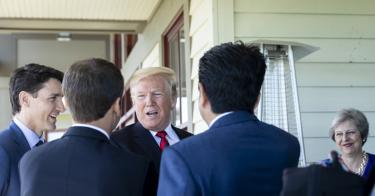Once a year, the heads of the world’s leading industrialized free-market democracies — the Group of Seven — get together. On the eve of this year’s meeting, President Donald Trump made a big bet. He imposed tariffs on steel and aluminum imported from the other G-7 countries, as well as on NAFTA partner Mexico.
The leaders of those other G-7 countries — Canada, Japan, the United Kingdom, France, Germany and Italy — quickly counter-punched, threatening to levy their own retaliatory tariffs on a host of well-known and high-profile American products such as Kentucky bourbon and Harley-Davidson motorcycles.
It was all rather shocking. Although they served a useful purpose in the past, the G-7 meetings of late have produced little more than photo-ops and political gab fests.
So what does this mean for the future of free markets? Are they dead, on life support, or just temporarily winded?
After an initial plunge a few months ago, when Trump first announced the possibility of imposing tariffs, Wall Street seems to be handling the G-7 drama with aplomb. For the most part, investors appear to be discounting Trump’s bet as tactical brinkmanship. After all, an immense amount of relatively free trade and investment transpires every day among companies and private citizens in G-7 — and France, Germany and Italy are the economic titans of the entire EU.
According to data from The Heritage Foundation’s Index of Economic Freedom, European Union countries have the same weighted average applied tariff rate as the United States. It is 1.6 percent. In terms of trade freedom, the U.S. score in the Index is actually lower than all but two EU countries (France and Greece); Canada and Mexico are also ranked higher than the United States for trade freedom. Japan has relatively less trade freedom, but its score, too, is way above the global average.
So, based on these data, Trump’s claim of U.S. victimhood at the hands of unfair trade practices by America’s best allies rings hollow.
Which is not to say that other G-7 countries do not protect certain sectors of their economies. They most certainly do, especially in Japan and the EU.
But at the core of this latest scuffle over trade is an elephant that will not be in the room at the G-7 in Canada: China and the global glut of steel caused by state-subsidized Chinese over-production.
The best way to counter that problem is for the G-7 countries to unify against unfair Chinese trade practices. That’s far more reasonable than turning a G-7 family squabble into a devastating trade war a la the 1930s.
Instead, the United States and its G-7 partners should work together to lower existing tariff and non-tariff barriers, allowing their citizens and companies to trade even more freely. Doing so will help to avoid self-inflicted damage to the American economy.
Trump demonstrated outstanding leadership in his courageous decisions to end U.S. participation in the Iran nuclear deal and the Paris climate agreement — two pacts that were championed by other G-7 leaders.
He also signed historic reform legislation to cut Americans’ taxes at a time when other G-7 leaders are pushing for higher taxes.
The president should not abandon the moral high ground on which those decisions were made, for the swamp of wrongheaded — albeit politically appealing — trade policies that will weaken the U.S. economy.
A unified G-7 that remains faithful to the values of market-based Western democracy and economic freedom can be America’s ally in the economic battles that lie ahead. That’s far more valuable than anything that can be gained by a trade war.
This piece originally appeared in T&D



